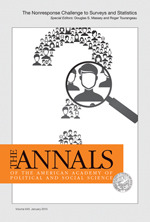The Nonresponse Challenge to Surveys and Statistics
Edited by:
- Douglas S. Massey - Princeton University, USA
- Roger Tourangeau - Westat, USA
Volume:
645
December 2012 | 236 pages | SAGE Publications, Inc
Surveys are the principal source of data not only for social science, but for consumer research, political polling, and federal statistics. In response to social and technological trends, rates of survey nonresponse have risen markedly in recent years, prompting observers to worry about the continued validity of surveys as a tool for data gathering. Newspaper stories, magazine articles, radio programs, television broadcasts, and Internet blogs are filled with data derived from surveys of one sort or another. Reputable media outlets generally indicate whether a survey is representative, but much of the data routinely bandied about in the media and on the Internet are not based on representative samples and are of dubious use in making accurate statements about the populations they purport to represent.
Surveys are social interactions, and like all interactions between people, they are embedded within social structures and guided by shared cultural understandings. This issue of The ANNALS examines the difficulties with finding willing respondents to these surveys and how the changing structure of society, whether it be the changing family structure, mass immigration, rising inequality, or the rise of technology, has presented new issues to conducting surveys. This volume will be of interest to faculty and students who specialize in sociological movements as well as economic and immigration movements and its effect on surveying.
Douglas S. Massey and Roger Tourangeau
Introduction: New Challenges to Social Measurement
Frauke Kreuter
Facing the Nonresponse Challenge
J. Michael Brick and Douglas Williams
Explaining Rising Nonresponse Rates in Cross-Sectional Surveys
Robert F. Schoeni, Frank Stafford, Katherine A. McGonagle, and Patricia Andreski
Response Rates in National Panel Surveys
Andy Peytchev
Consequences of Survey Nonresponse
Eleanor Singer and Cong Ye
The Use and Effects of Incentives in Surveys
Kristen Olson
Paradata for Nonresponse Adjustment
John L. Czajka
Can Administrative Records Be Used to Reduce Nonresponse Bias?
Tom W. Smith and Jibum Kim
An Assessment of the Multi-level Integrated Database Approach
Douglas S. Massey and Roger Tourangeau
Where Do We Go From Here? Nonresponse and Social Measurement
